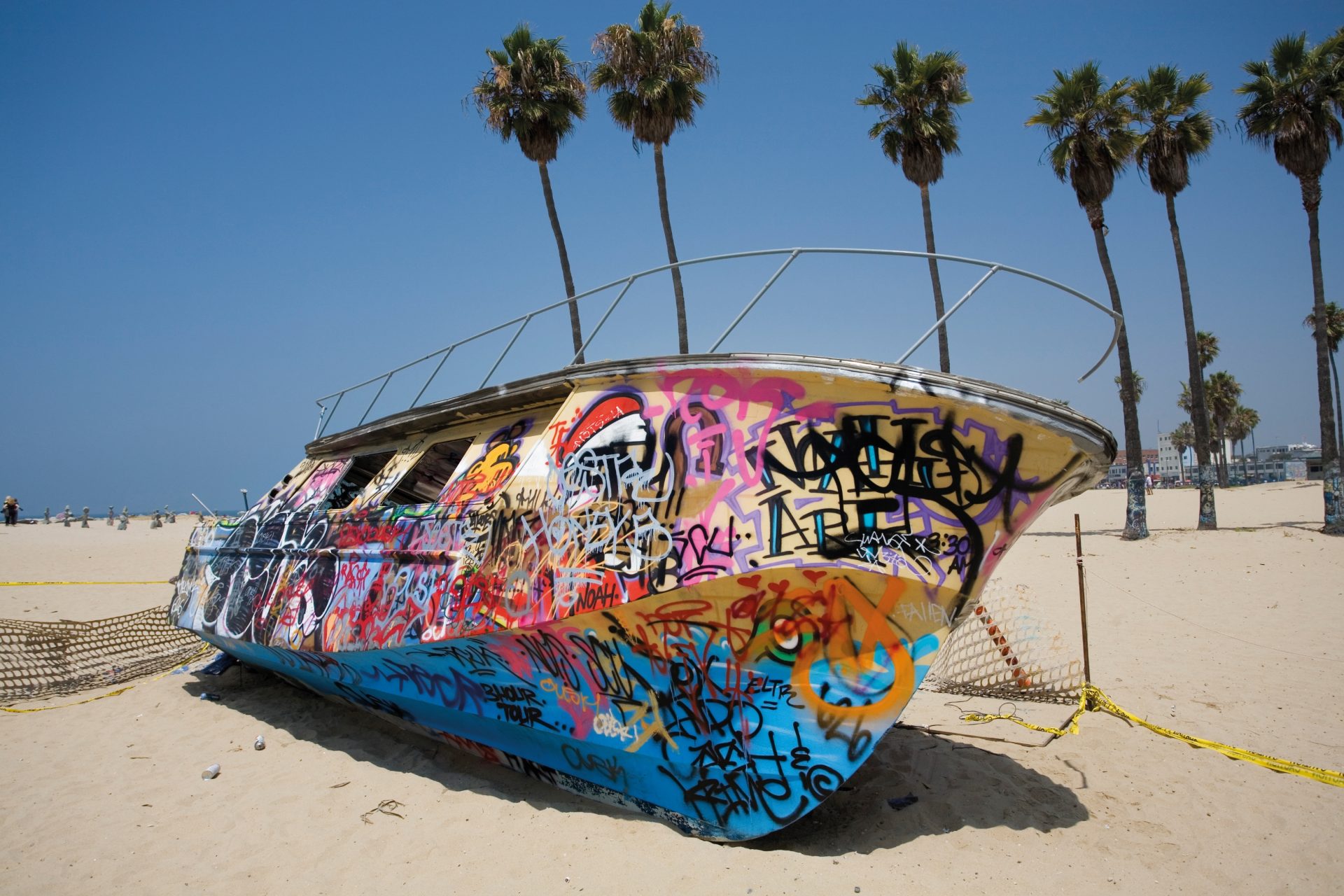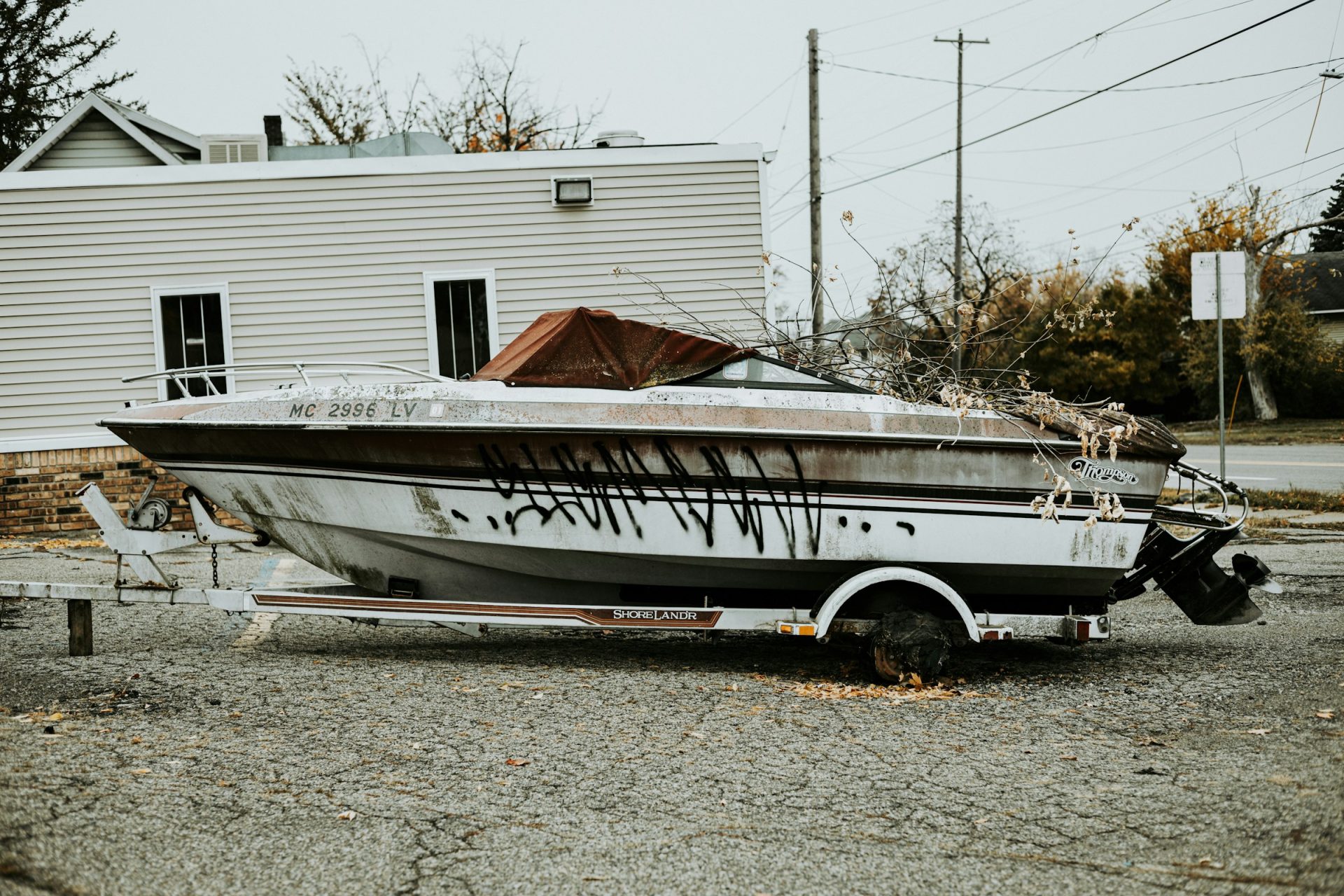Vandalism protection
It’s not usually top of mind but it’s definitely something worth considering – is your boat protected from vandalism? If you don’t know, you should, so you can protect your interests in the case of unexpected malicious acts.
Written by Marcel Vaarzon-Morel
23 April 2024
As part of an environmental protest, the superyacht Kaos was recently spray-painted while berthed at a marina in Ibiza – and it’s a wake-up call for marina managers, captains and boat owners worldwide.
While in Australia it’s generally considered that standards in providing the relevant security and insurance are high, it can’t be assumed that all marinas or piers around the globe carry the necessary coverage.
Given the practical realities of cruising from port to port, this transient situation may not always allow for the review of security or insurance policy coverage. Therefore, ensuring the vessel’s security systems are up-to-date and its insurance policy indemnifies the owner against vandalism is paramount given the difficulties when trying to claim damages through the court system.
While in the case of Kaos the vandals were apprehended and charged with a criminal act, it doesn’t follow that the individuals in question will compensate the owner. In the face of a successful guilty verdict, a fine may form part of the sentencing options, however compensation, or damages, to reimburse the owner are not typically available, or only in a limited sense.
In Australia, for damages to be sought, it would have to be attained through a civil claim against the accused, which is problematic – and also why ensuring the vessel is adequately insured is so important. To understand if a civil claim is commercially possible, two questions need to be considered. First, does the accused have deep pockets? That is, can they or a group they are affiliated with pay the damages and legal costs? The second question is, if a claim is successful, will the awarded costs and damages be recoverable?
Apart from the difficulty of reclaiming damages and adding to this nightmare, it may also be the case that legal action would have to be undertaken in a foreign jurisdiction, and the time taken to pursue a legal claim could be years.
In Australia, marine insurance policy contracts are governed by the Marine Insurance Act 1909 (MIA). Under the MIA, marine insurance contracts are limited to losses that are incidental to a marine adventure. Maritime insurance contracts can cover a variety of incidences, goods and damage depending on the policy.
Given the varied uses of watercraft, there really is no one-size-fits-all policy when it comes to marine insurance.
Therefore, it’s important to consider what policy will best safeguard your needs in the event of the unexpected, such as loss, theft and damage – both malicious and accidental.
It’s also worth considering different policies and negotiating with your insurer to get a policy that covers your needs and boating activities. Depending on the policy you choose, the insurable property may be covered against third-party liability, and you may want to consider getting additional cover for fishing gear and water skiing or diving equipment. Some contracts protect mixed sea and land risks and provide cover for non-marine risks that are incidental to a sea voyage. It’s this mixed policy that is critical in regards to vandalism.
Often, after a policy is entered, it’s not reviewed in light of changing circumstances, so to ensure the policy is not voided, it’s vital to ensure that you operate your boat within the terms of your policy. For example, it’s common for policies to have geographical limits, so if you’re taking your boat beyond such limits, you may require additional cover.
A policy can also be affected if you modify your boat, so if you plan to do so, notify your insurer as soon as possible. In addition, a common argument used to avoid paying claims is that the boat is not well maintained by professionals and in good condition, and thus the boat is deemed unseaworthy.
Getting the boat’s value right can be complicated when weighing up agreed-value or market-value policies that factor in the value of your vessel and consider depreciation, the financial climate, cost of additions and improvements, gear and equipment, the boat’s condition and the amount of potential damage.
If your vessel is relatively new, some insurers will allow owners to insure it for the cost of a new replacement, so it may be worth considering this option and discussing it with your insurance provider. If you don’t get the valuation correct and have a marine mortgage, you could be placed in negative equity if there is loss or damage to your boat.
At the other end of the spectrum, insuring a boat for more than what it’s worth without alerting the insurer may lead to the insurance provider refusing to pay the full policy value if it can be shown that you’ve intentionally inflated the valuation. An agreed fixed-value policy is preferable to avoid potential disputes over the policy value when settling a claim.
While you may have concerns regarding a marina berth, you’re not necessarily out of hot water by choosing a mooring option. One major area of risk minimisation among maritime insurance providers is the refusal of some boating insurance providers to cover damage to, or caused by, moored vessels. Some major insurance providers will only cover damage to a boat caused when it is actually in use.
Given that mooring failure is a frequent cause of loss, it’s important to consider the amount of potential loss that could be caused to and by your vessel while it is moored. If you require insurance for your moored vessel, it’s important to make appropriate enquiries and checks when choosing your policy and ensure that your policy will cover the failure of a mooring through no fault of the owner.
Insurance policies that cover moored vessels often require that the mooring is well maintained, serviced by a professional mooring contractor at least once a year, and that the mooring is designed and suited to the particular type of boat. A certificate and letter from the mooring company that confirms the mooring is appropriate and has been serviced regularly is generally required to cover the boat owner. This adds to the importance of keeping mooring within standards, keeping proper records, and ensuring that the correct mooring has been installed.
Finally, be aware that most maritime insurance providers don’t cover your boat while it’s out of the water for repair.
If this is the case, be especially wary of waivers that may state that the operator or broker accepts no responsibility for damage to the boat and/or damage caused by the boat to third-party property while they’re on it.
If you’re employing contractors to repair your boat, they may not be insured either. So, before you allow a contractor to complete work, it’s prudent to ask to see their insurance coverage certificate, which will inform you of the limits of their policy. Also, bear in mind that if an uninsured tradesperson on your boat damages someone else’s vessel, the owner of that vessel or their insurer will target everyone in sight to recover costs, including you.
A unique feature of maritime insurance compared to other forms of insurance is differing thresholds of causation, which may be defined in a marine insurance contract. While the proximate cause test is well established in general insurance law, in maritime insurance law, depending on the insurance policy and wording, a different scope of causation can be adopted.
Often, maritime insurance policies require that an insured event is the major cause of the damage or will assert that an exception to the coverage applies. Because the scope of causation can vary among policies, it’s vital to be aware of your insurance policy’s terms.
Enjoying your boat should be plain sailing, but always factor in the unexpected. While no-one likes to think about boating from a claims perspective, the reality is that there are thousands of insurance claims made for boating accidents and damage every year.
Disclaimer
Ocean Media takes no responsibility for the views held in this article. Readers are always encouraged to obtain their own advice particular to their individual situation.

Marcel Vaarzon-Morel
Ocean’s resident legal expert Marcel Vaarzon-Morel, a professional lawyer and director of Vaarzon-Morel Solicitors, specialises in the marine industry and maritime law.








